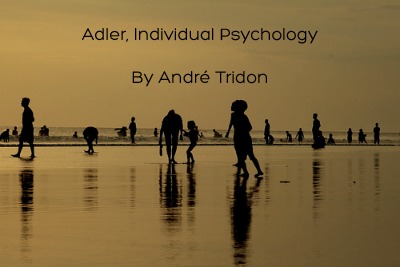Psychology Classics On Amazon

Adler, Individual Psychology

(Photo Credit: Saylow via flickr creative commons)
'Adler, Individual Psychology' By André Tridon was first published in 1920. This classic article offers a clear and concise account of the theories of Alfred Adler, including details of his major points of disagreement with Sigmund Freud.
The Article in Full
Adler does not call himself a psychoanalyst. After breaking away from the Freudian camp he designated his research work and his methods of psychiatry as Individual Psychology. The term has merits, for there are no cut-and-dried rules in the study and treatment of mental disturbances and every case must be approached from a different angle. It has not, however, been used by anyone else in the literature of psychoanalysis.
Freud considers human life as the result of the play of unconscious forces which drive us blindly and which we are in no way capable of leading or regulating. The repressed desires which are constantly seeking an outlet and which by creating an abnormal outlet for themselves upset at times our mental balance, serve no definite purpose.
Jung, dissatisfied with this form, of psychological fatalism, contended that the neurosis was an unsuccessful attempt at adjusting one's conduct to the problems of the present.
Adler thinks that all the forces of the individual are tending toward a definite goal and that in every manifestation of life we can find traces of a dominating or guiding idea.
In other words, Freud emphasized the importance of the past, Jung that of the present, Adler that of the future.
To Adler the most minute trait of psychic life is permeated with a purpose-force. Every psychic event bears the impress, or in other words is a symbol of a uniformly directed plan of life which only comes to light more clearly in the neurosis. But none of the neurotic traits are characteristic of the neurotic exclusively. The neurotic shows no single idiosyncrasy which cannot be proved to exist in the healthy individual, although it may only be revealed to the subject or the analyst through analysis.
Adler reached his psychological viewpoint after studying the effect which some organic inferiority has on the mental and physical health of the individual. While Freud started in life as a hypnotist and under the influence of Charcot and Bernheim, Adler's first work was a monograph on Organ Inferiority.
Nature is constantly at work to compensate for all the deficiencies found in the organism. If one kidney is removed the other grows larger and does as much work as two did. If some of the heart valves are destroyed the muscular activity of the heart increases and thus the blood stream is kept in motion at the proper rate. But nature does more than that. An organ's capacity for work depends not only upon its physical condition but on the nerve impulses sent to it by the central nervous system. A defective organ may be made to function properly through a vigorous exercise of the will. The weakened organ is likely to become, on that account, unduly sensitive and in this peculiarity we can find the roots of nervous suffering.
A patient suffering from nervous gastric or intestinal trouble, for instance, is often one who once suffered from such a disturbance and was cured. The ailment may have affected him in his early childhood, but the memory of it has been retained unconsciously and is recalled when the occasion arises.
The neurotic, Adler says, suffers from a feeling of incompleteness for which he seeks compensation. The entire picture of the neurosis and all its symptoms are influenced if not provoked by an imaginary fictitious goal. It is not the "libido" which is the motive force behind the phenomena of the neurosis, but the wish to be a complete man. The libido, the sex cravings and the tendencies to per versions become subjugated by this power. Adler in this respect agrees with Nietzsche's theory of the will-to-power and will-to-seem and also with some of the older writers who held that the feeling of pleasure originates in a sense of power and the feeling of pain in a sense of weakness.
Adler objects to Freud's contention that the neurosis has a sexual origin. The sexual picture, he says, deceives easily the normal person and more easily yet the neurotic, but it must not deceive the psychologist. The neurotic phenomenon is given a sexual tinge by the antithesis "masculine-feminine" which has gradually imposed itself upon human thinking and which obsesses neurotic thinking. The assumption (now less generally spread, but universal before the feminist movement began to check it), that masculine meant also superior and strong, and that feminine meant inferior and weak, is gospel truth to the neurotic and a source of great suffering.
The sexual trend in the neurotic's fancies and in his life leads toward the masculine goal. The whole picture of the sexual neurosis is simply a graphic presentation of the distance separating the patient from the imaginary masculine goal which he is trying to reach.
The neurotic is not, as Freud thought, obsessed by infantile wishes which come to life nightly through his dreams. For those infantile wishes are themselves subordinated to the fictitious goal, and adapt themselves to symbolic expression for the sake of convenience.
A sickly girl who, during her childhood, was conscious of her insecurity and who has to rely entirely on her father as far as her present and future security is concerned, tends to usurp some of her mother's privileges and may imagine the entire situation in the form of an incest; she is taking the place of her mother in her father's affections; &he is almost as important to her father as though she were her father's wife. She may never marry, for marriage with a stranger would not mean the security she finds with her father, who is stronger, wiser, and makes no physical demands likely to humiliate her ego. With a little imagination she may easily conjure up the symbolic picture of an incestuous relation.
Freud saw in this fantasy a re-birth of infantile wishes. Adler sees in this attempt to reach into the remote past, in that tendency of the neurotic to abstraction and symbolization, a clever unconscious scheme to attain security, to vouchsafe to the ego the greatest amount of gratification and to reach the masculine goal. How do neurotic symptoms originate? Why does the patient wish to be a man and constantly seek to prove to himself his virility? Why does he need so many egotistical forms of gratification?
Because, Adler answers, there stands at the threshold of the neurosis a threatening feeling of inferiority and life becomes unbearable unless the neurotic can look forward to a situation which assures him, normally or abnormally, safety and superiority. The neurotic individual, aside from his purely neurotic symptoms, will easily become conspicuous owing to his evident inability to adapt himself to his environment. The consciousness of his weak point obsesses him to such a degree that often without knowing it, he begins to build over it a protective structure.
His sensitiveness becomes more acute; he learns to discern relationships which escape others, he exaggerates his cautiousness, anticipates all sorts of unpleasant consequences when he starts out to do something or suffers some injury; he endeavors to hear and to see more than others can hear or see; he belittles himself; he becomes insatiable, economical, constantly strives to extend the boundaries of his influence and power over space and time and soon loses the peace of mind and the freedom from prejudice which guarantee mental health. His distrust of himself and others, his envy and maliciousness become more and more pronounced. He either tries to gain the upper hand in cruel, aggressive ways or he endeavors to dominate his environment by his very humility and submissiveness.
Freud points out that the neurosis is a means of escape from reality. Adler stresses the fact that to the neurotic, life is nothing but a dangerous adventure. Not only must he escape that danger but he must construct a strong system of defense that will protect him against it. The man for whom every woman constitutes a temptation may develop in his mind an obsessive fear of syphilis, after which he thinks himself secure behind that protective wall; the unhappily mated wife escapes intercourse which is odious to her by developing vague pains in her sexual organs; an overworked country preacher runs away and becomes for a period of time a fruit seller; the bed-ridden neurotic who finds life too monotonous has peculiar attacks, rushes to a window, threatens to commit suicide and hence secures the constant company of a nurse.
All these neurotic symptoms are ready-for-use attitudes. The patient is not shamming. He un consciously remembers earlier defects, earlier sieges of sickness and reproduces them when an emergency arises. He unconsciously produces the required symptom as the fingers of a pianist reproduce without any conscious effort a certain combination of notes which has been carefully memorized.
Adler foresees the objections which such a theory is bound to bring forth. How can trigeminal neuralgia, insomnia, paralysis, sick headaches, etc., afford the neurotic any form of gratification? Because neurotic symptoms are in the majority of cases sure means for obtaining mastery over another person. And to that craving for power and superiority the neurotic is as ready to sacrifice his comfort as normal human beings are to undergo hardships in order to attain some of their ideals. The neurotic's absurd goal is an abnormal ideal, but to him an ideal just the same.
To Adler, dreams only acquire a meaning when we consider them as a symbol of life. The dream is a sketch-like reflection of psychic attitudes and reveals to the investigator the manner in which the dreamer regards certain problems. The dream is not the fulfillment of some infantile wishes, but a neurotic way of securing for the ego an easy form of gratification, and of solving problems which to the neurotic appear too complicated. Repeated dreams of the same type reveal the course followed by the fictitious guiding line. They indicate various attempts at solving one problem and hence betray a characteristic feeling of uncertainty.
The analysis of dreams appears as essential to Adler as to Freud as a part of the analytic treatment. Adler, however, rejects entirely the literal Freudian interpretation and shares some of Jung's symbolistic views. The incest motive he thinks is as little real in dreams as it is in the waking life of the individual. When man dreams for instance of intercourse with his mother, he is just running back to her for protection as he did when a child. The fact that near relations appear so often in our dreams in sexual situations is due to the very make up of our unconscious. There are in our unconscious several layers of memory pictures and the deeper we go, the fewer pictures we find, until arriving at the bottom we only find the parents, the first pictures the individual ever beheld. That those are more likely to recur than any others and to be used symbolically whenever our archaic, primitive unconscious needs human types to symbolize men or women, is easily understood.
While Freud stressed the love motive, Adler stresses the power motive and thus explains the neurotic's strange inability to love, his strange tendency to become self-centred. Intent on protecting himself against all the perils of life, the neurotic is constantly on his guard. To surrender to any tender feeling would mean to him to submit to some other ego. Love to him is only another danger to be warded off, a weak spot in his defense system through which the enemy, life, might enter to defeat him. The neurotic will either try to be an ascetic or a Don Juan. As a misogynist he will proclaim his superiority over every woman, as a Don Juan he will proclaim woman's frailty and his irresistible virility. In either direction he will be found totally lacking in measure.
Artistic creation, to Adler, is simply another form of compensation for the individual's organic shortcomings. Organs of slight inferiority may develop, he says, greater functional capacities than normal organs. All mental operations have a tendency to concentrate on the weak organ in order to protect it from harm. Singers, speakers, actors, he says, have generally recovered from some organic defect which in their infancy and childhood prompted them to exercise their defective throat, tongue or lips. Musicians may have been overexercising a defective ear. Painters became interested in colours and nuances owing to their originally weak eyes. Adler calls our attention to the fact that Demosthenes, who became Greece's greatest orator, struggled for many years with an impediment in his speech, that Mozart and Beethoven suffered from severe ear trouble, that Bruckner's ears were stigmatized by moles, and that there are more cases of defective vision among pupils of art schools than among any other classes of the population.
He even holds that our sense of inferiority determines the profession we embrace in real life and mentions that many excellent chefs he examined were suffering or had recovered from acute gastric trouble. Their inferiority caused them to pay special attention to food and its preparation, etc.
The social bearing of Adler's doctrines is briefly indicated in the preface to the second edition of his Neurotic Constitution: "Our Individual Psychology has gone far beyond the dead line of descriptive psychology; to understand a man means to save him from the errors into which he is led by his sore, frantic but futile craving to be like unto God and to make him amenable to the unshakable logic of human community life, to instil into him the community sense."
This stylish Alfred Adler Heart Shape Word Cloud T-Shirt is perfect for anybody with an interest in Adlerian psychology. Also ideal for helping to promote Adler's groundbreaking concept of social interest "Gemeinschaftsgefühl"; i.e., the importance of feeling engaged and connected with one's community, which is as relevant today as it has ever been. Sales help support All-About-Psychology.Com which has been providing free and comprehensive information and resources for psychology students and educators since 2008.
Recent Articles
-
Promoted Psychology Books | All-About-Psychology.com Showcase
Apr 24, 25 03:20 AM
Discover standout titles featured through expert psychology book promotion. See what authors are sharing—and how their work is reaching new readers. -
All About Psychology
Apr 22, 25 02:37 PM
A psychology website designed to help anybody looking for detailed information and resources. -
Sponsor a Psychology Website with Over a Million Yearly Visitors
Apr 22, 25 10:07 AM
Showcase your brand to a huge, engaged audience. Discover how to sponsor a psychology website trusted by over a million visitors a year.
Please help support this website by visiting the All About Psychology Amazon Store to check out an awesome collection of psychology books, gifts and T-shirts.
Go To The Main Alfred Adler Page





New! Comments
Have your say about what you just read! Leave me a comment in the box below.